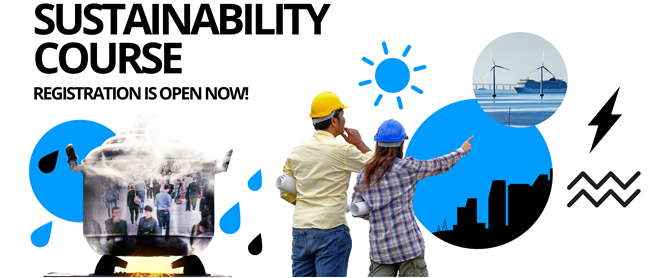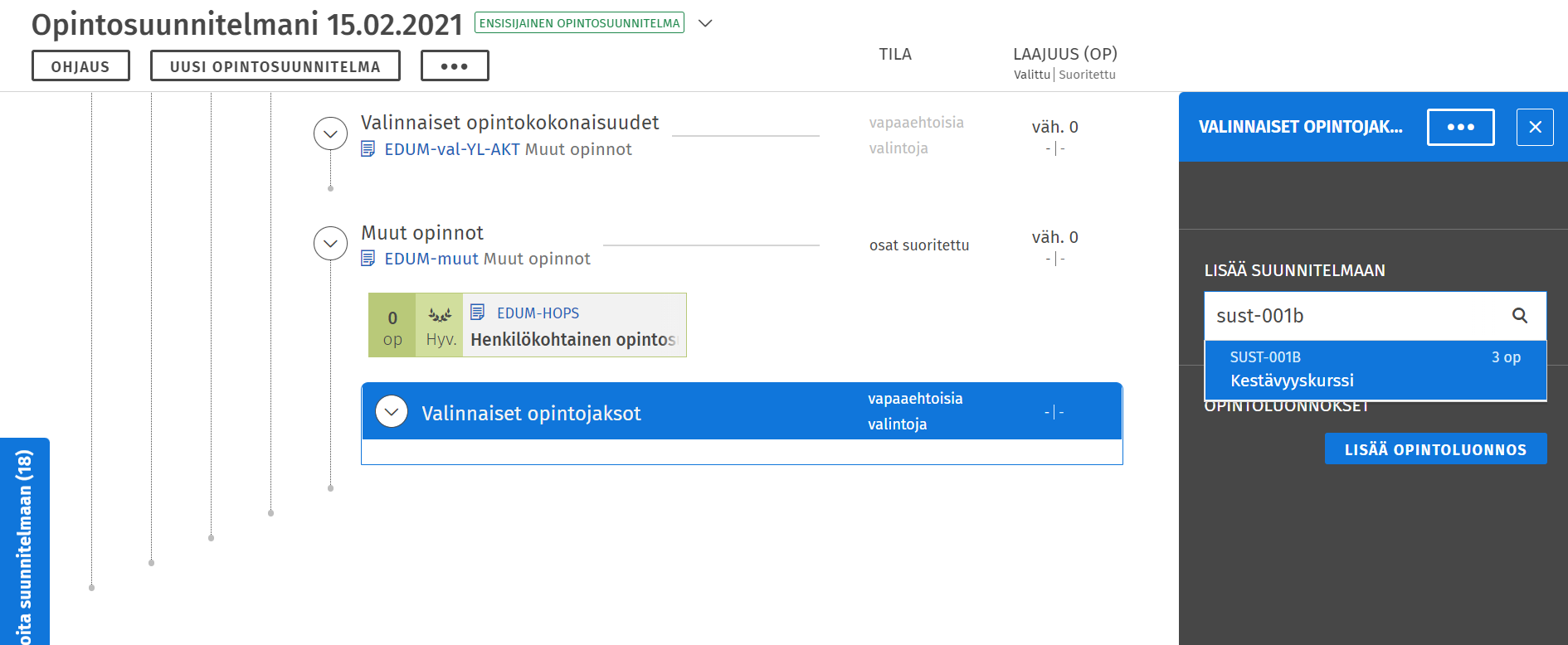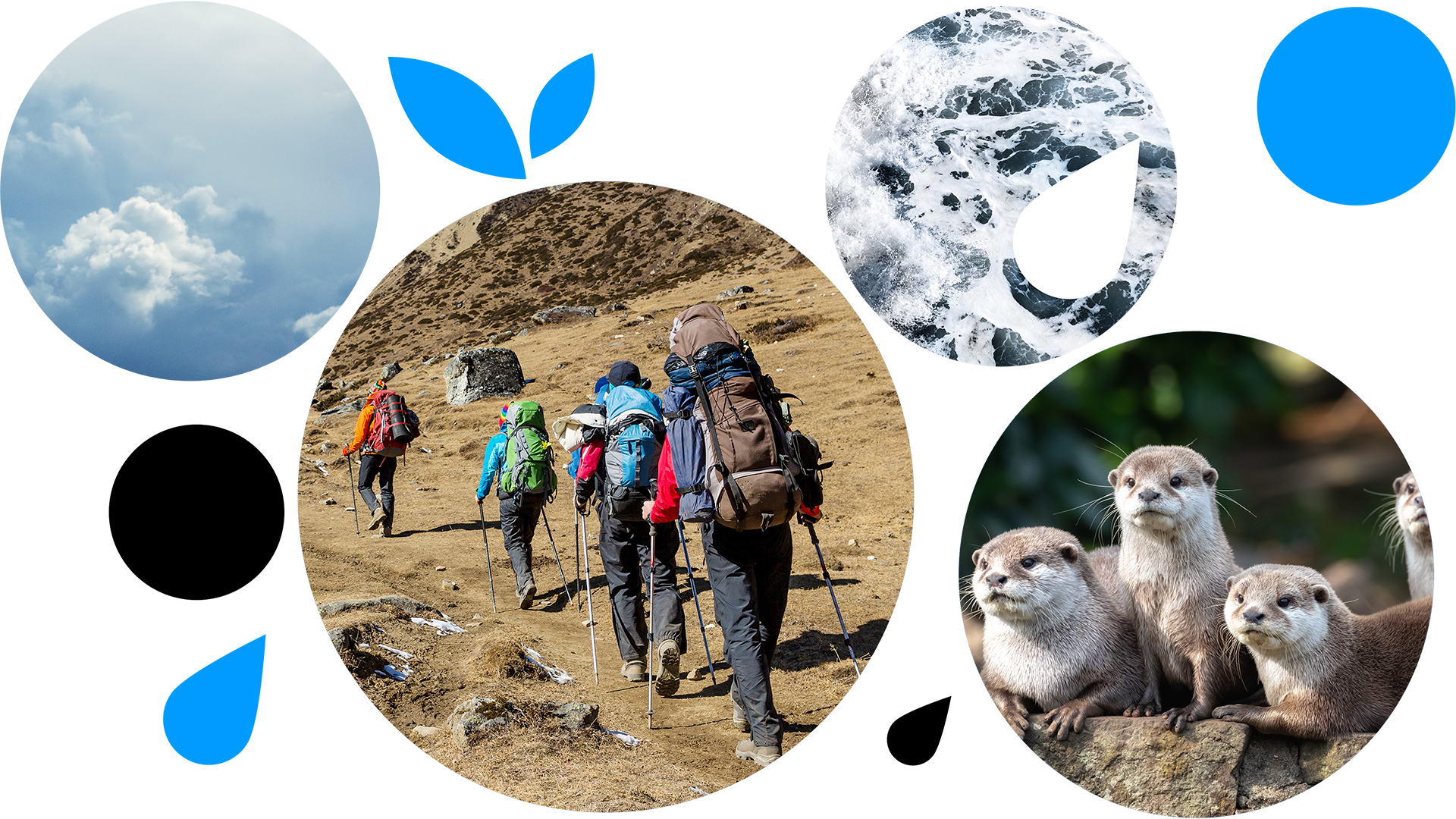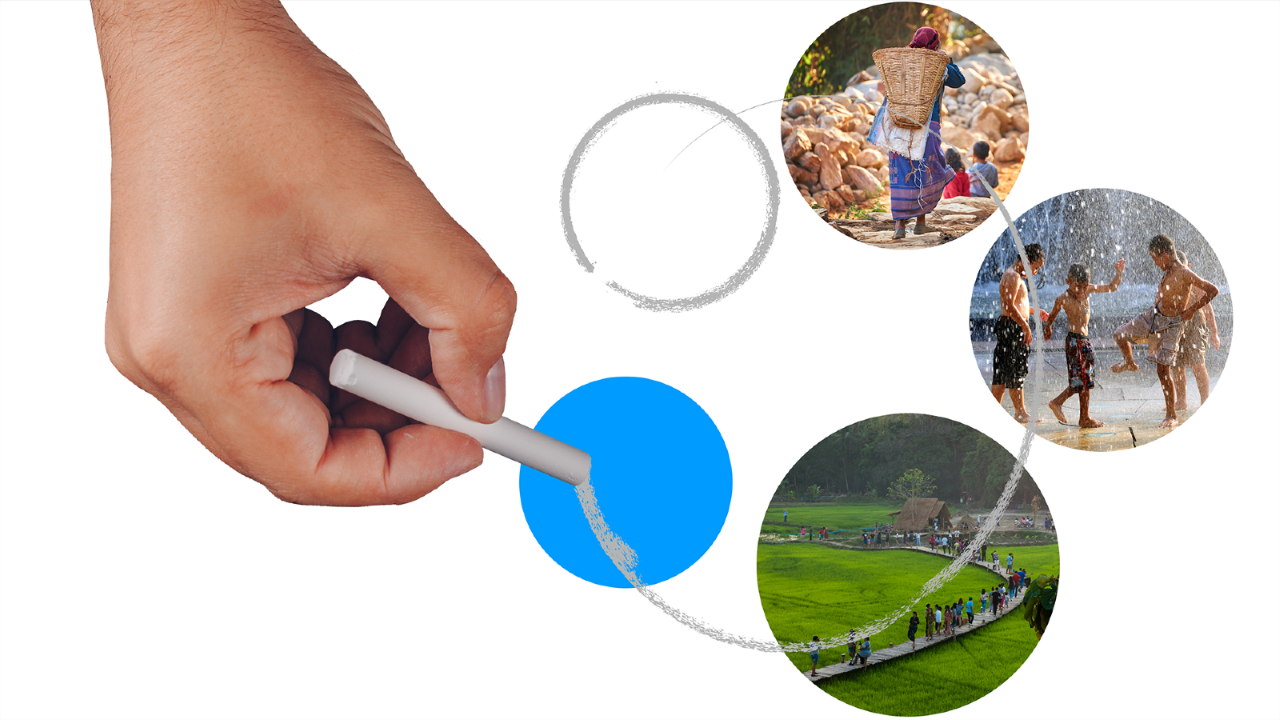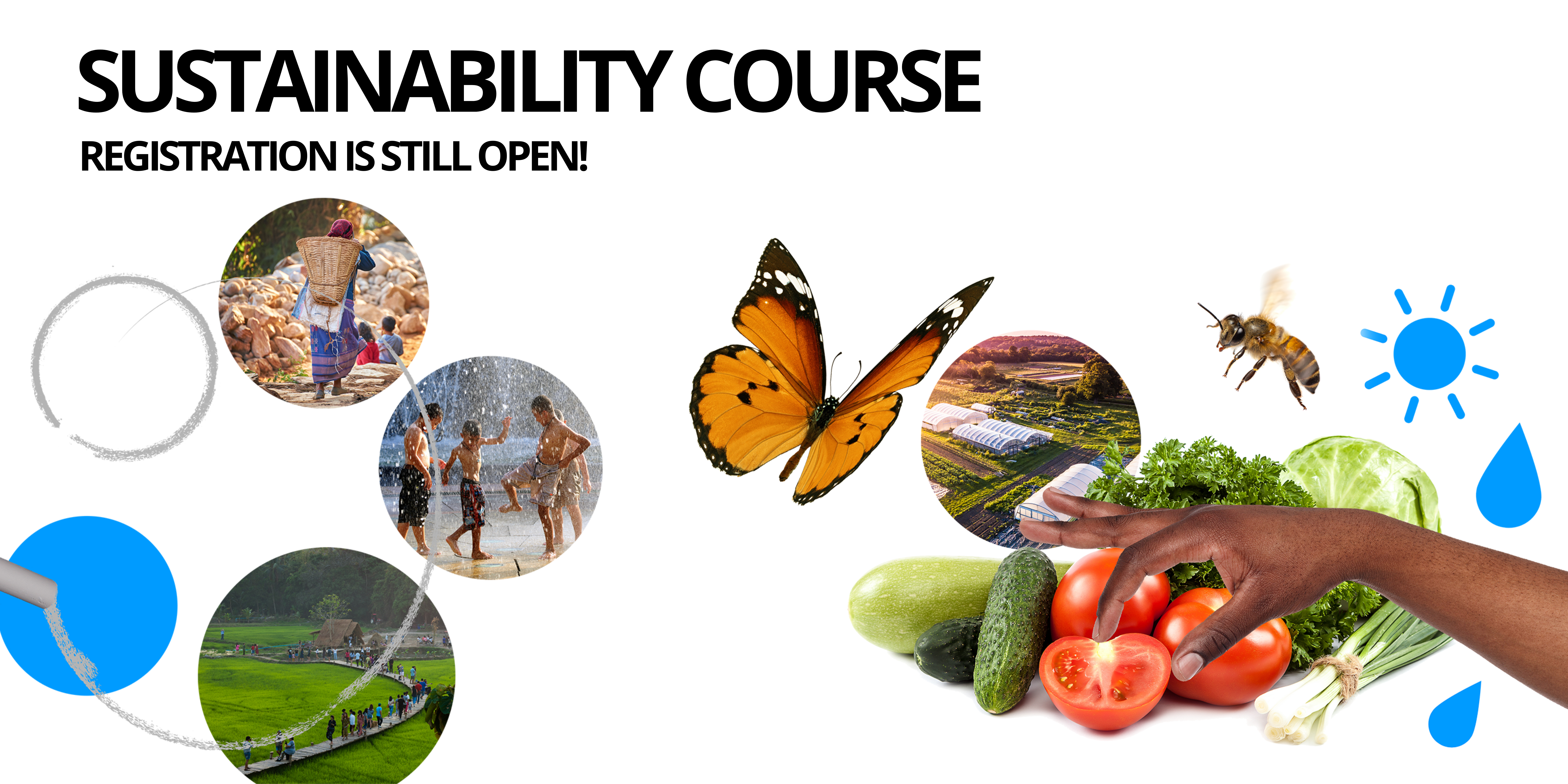
In english below.
Kestävyyskurssi koostuu kahdeksasta moduulista, joiden kautta pääset tarkastelemaan keskeisiä käsitteitä, havaintoja käynnissä olevista kestävyyshaasteista, taustalla olevia prosesseja ja ilmiöitä sekä ratkaisukeinoja kestävyyskysymyksiin. Kaksi ensimmäistä moduulia ovat kaikille yhteiset. Vapaavalintaisista temaattisista moduuleista voit valita yhden moduulin kiinnostuksesi mukaan. Temaattiset moduulit rakentuvat kuudesta YK:n esittelemästä lähtökohdasta kestävyysmurrokseen.
Alla pääset tutustumaan moduuleihin tarkemmin, jotta löydät niistä juuri itsellesi sopivan! Löydä itseäsi kiinnostava aihepiiri ja liity mukaan kurssille!
1. JOHDANTO: Kestävyys käsitteenä, kestävyyskysymysten monimutkaisuus ja systeeminen lähestymistapa
Mitä on kestävyys? Mitä se tarkoittaa?
Kestävyydellä tarkoitetaan ihmiskunnan kykyä säilyä olemassa muun luonnon rinnalla. Kestävyys tarkoittaa sellaisten valintojen tekemistä, jotka eivät vahingoita Maapallon rajallista kantokykyä ja jotka tukevat lajienvälistä ja -sisäistä tasa-arvoa. Kestävyys on rinnakkaiseloa maapallolla, sekä ihmisten että muiden lajien tarpeiden turvaamista.
Kurssin ensimmäisessä osassa tulet oppimaan, mitä kestävyys tarkoittaa ja yhdistämään sen muihin käsitteisiin, kuten heikko ja vahva kestävyys sekä planetaariset rajat. Moduuli antaa sinulle yleiskuvan ihmisen toiminnan ja sen ympäristövaikutusten välisestä suhteesta sekä erilaisista kestävän kehityksen käsitteisiin liittyvistä jännitteistä.
2. RATKAISUJA kestävyyskysymyksiin
Kestävyysongelmien monimutkaisuus tekee niistä viheliäisiä ja vaikeita ratkaista. Globaalien ongelmien ratkaiseminen vaatii monialaista yhteistyötä paikallisella, kansallisella ja kansainvälisellä tasolla; jokaisen osallisuutta ongelmien ratkaisemisessa tarvitaan, sillä ne ovat liian suuria yksin ratkottavaksi.
Ratkaisut – moduulissa tutustut näkökulmiin ja työkaluihin, joita tarvitaan viheliäiden kestävyysongelmien ratkaisemisessa. Tässä moduulissa tulet pohtimaan sekä itseäsi että yhteiskuntaa ja instituutioita toimijoina ja kestävyysmurroksen edistäjinä. Riittävien ratkaisujen kehittäminen monimutkaisiin ongelmiin vaatii luovaa ja monialaista otetta. Tämän vuoksi moduulissa reflektoidaan tietoja ja taitoja, joita tarvitaan monialaisessa ratkaisujen kehittämisessä.
Temaattinen moduuli A: Globaalien luonnonjärjestelmien turvaaminen
Lajien välisten monimutkaisten vuorovaikutussuhteiden kautta maapallolla kaikki on yhteydessä toisiinsa. Ihmiselämä on riippuvainen toimivista ekosysteemeistä, jotka itsessään riippuvat luonnon monimuotoisuudesta eli biodiversiteetistä. Tässä moduulissa pääset syvemmin tutustumaan globaaleihin luonnonjärjestelmiin ja niiden turvaamiseen sekä luonnon ja yhteiskunnan vuorovaikutussuhteisiin. Tulet myös ymmärtämään miten oma tieteenalasi on yhteydessä globaaleihin luonnonjärjestelmiin liittyviin kysymyksiin, sekä miten tieteenalasi voi osallistua ongelmien ratkaisemiseen.
Temaattinen moduuli B: Hyvinvointi ja mahdollisuudet muutokseen
Kestävyysongelmat ovat seurausta ihmisten toiminnasta. Samalla ihmisten hyvinvointi on voimakkaasti yhteydessä ekosysteemien tilaan. Tässä moduulissa opit tunnistamaan erilaisia hyvinvoinnin ulottuvuuksia ja kuinka ne ovat yhteydessä luonnonjärjestelmiin. Ihmisten hyvinvointiin liittyy myös kohtuus ja oikeudenmukaisuus, jotka ovat keskiössä kestävyysongelmien ratkaisussa. Moduulissa pääset tarkastelemaan erilaisia lähestymistapoja hyvinvointiin. Opit mitä haasteita tavanomaisissa lähestymistavoissa hyvinvointiin on, ja kuinka hyvinvointia voidaan arvioida uudelleen. Opit myös tunnistamaan erilaisia strategioita ihmisten hyvinvoinnin parantamiseen ja keskustelemaan niistä.
Temaattinen moduuli C: Kestävä ja oikeudenmukainen talous
Vallitseva globaali talous perustuu jatkuvaan talouden kasvuun, mikä on johtanut luonnonjärjestelmien heikentymiseen ja aiheuttanut ongelmia ihmisten hyvinvoinnille. Toisin sanoen, nykyiset keinot harjoittaa taloutta ovat kestämättömiä. Jatkuvan taloudellisen kasvun tavoittelu uhkaa luonnonjärjestelmiä, joista kaikki elämä on riippuvaista.
Tämä moduulissa esitellään, kuinka erilaiset talousjärjestelmät ja lähestymistavat ovat kehittyneet. Moduulissa tarkastellaan kriittisesti jatkuvaan kasvuun perustuvia talousjärjestelmiä ja tutkitaan vaihtoehtoisia kestäviä ja oikeudenmukaisia talousmalleja. Moduulissa pääset tunnistamaan ja tarkastelemaan kriittisesti erilaisia talousjärjestelmiä. Pääset myös kehittämään ymmärrystäsi olennaisista kestävän ja oikeudenmukaisen talouden osista.
Temaattinen moduuli D: Kestävä ja terveellinen ruokajärjestelmä
Terveellinen ja ravinteikas ruokavalio on ihmiselämän ja -toiminnan perusta. Kuitenkin nykyinen ruoantuotantojärjestelmä muokkaa maapallon järjestelmiä kestämättömällä tavalla. Kestämätön ruoantuotantojärjestelmä uhkaa ruoantuotantoa itsessään sekä aiheuttaa tiettyjen planetaaristen rajojen ylittymisen. Tässä moduulissa pääset kehittämään ymmärrystäsi ruokajärjestelmien moniulotteisuudesta ja haasteista, jotka vaikuttavat kestävien vaihtoehtojen kehittämiseen ja kaikille sopivien ratkaisujen löytämiseen. Moduuli antaa yleiskuvan ympäristöllisistä ja yhteiskunnallisista vaikutuksista yleisissä ruoantuotannon muodoissa ja kuinka kehittää kestäviä ruoantuotannon järjestelmiä.
Temaattinen moduuli E: Ilmastonmuutos ja oikeudenmukainen energiasiirtymä
Ilmastonmuutos on koko ihmiskuntaa uhkaava tekijä, jolla on monimutkaisia vuorovaikutussuhteita kaikkiin planeettamme järjestelmiin. Tässä moduulissa pääset perehtymään ilmakehän fysikaalis-kemiallisiin prosesseihin, jotka vaikuttavat ilmastojärjestelmässä. Ilmastonmuutos ei uhkaa pelkästään maapallon ekosysteemejä, vaan myös ihmiskunnan olemassaoloa. Moduulissa keskitytään ilmastonmuutoksen vaikutusten lieventämiseen kansainvälisessä ja paikallisessa politiikassa. Moduulissa esitellään sekä kansainvälisen että paikallisen politiikan yhteyksiä ja riippuvuussuhteita siirtymisessä kohti oikeudenmukaisia energiajärjestelmiä. Ilmastonmuutoksen vaikutusten lieventäminen ja siirtymä kohti kestävää ja oikeudenmukaista energiataloutta vaatii, että ymmärrämme yhteisöjen, hallitusten ja kuluttajien roolin päätöksenteossa ja energiapolitiikassa. Moduulin tavoitteena on, että saat ymmärrystä maapallon järjestelmistä, tekijöistä, jotka vaikuttavat ilmastonmuutokseen, sekä kestävistä energiasiirtymistä. Moduulin lopussa tarkastellaan kriittisesti yhteiskunnan eri toimijoiden roolia oikeudenmukaisen energiasiirtymän toteuttamisessa.
Temaattinen moduuli F: Kaupunkiseutujen kehitys
Tässä moduulissa pääset perehtymään kaupungistumiseen ja kestäviin kaupunkeihin sekä kuinka ilmastonmuutos ja luontokato haastavat kaupunkien hallintoa. Sosiaaliset ja alueelliset muutokset, kuten sosiaalinen epätasa-arvo ja alueellinen eriytyminen muokkaavat myös kaupunkien rakennetta. Ne ovat samalla merkittäviä haasteita kaupunkien hallinnolle ja näyttäytyvät eri alueilla eri tavalla; tulet oppimaan millä tavoin nämä ilmiöt esiintyvät globaalissa etelässä ja pohjoisessa. Moduulin tavoitteena on antaa sinulle eväitä kaupunkeihin kohdistuvien kasvavien riskien ja mahdollisten ratkaisujen pohtimiseen sekä niistä keskustelemiseen. Tämä moduuli tarjoaa mahdollisuuden perehtyä siihen, kuinka kestävyyttä voidaan tutkia ja toteuttaa kaupungeissa ja niiden reuna-alueilla.
Mistä aihealueesta haluaisit oppia lisää? Heräsikö kiinnostus päästä kehittämään ratkaisuja viheliäisiin kestävyysongelmiin? Tule mukaan Kestävyys kurssille SUST-001B neljännessä periodissa 14.3.-8.5.2022. Ilmoittautumiseen pääset täältä. Ilmoittautuminen kurssille on auki 11.3. asti.
In English:
The Sustainability Course consists of eight modules through which you are introduced to the complexity and interdisciplinarity of the concept of sustainability. The first two modules are common for everyone. After that you choose one module which you will study and make the group assignment on. This allows you to tailor the course according to your own interests. The modules are based on ‘six entrypoints’ identified by the UN.
Below is a short introduction to all of the modules. Have a look and join us in the Sustainability Course!
INTRO: Sustainability as a concept, the complexity of sustainability challenges, and systemic approach
What is sustainability? What does it mean?
Sustainability is a complex concept: different disciplines have different ways of conceptualizing and operationalizing sustainability. It is about making choices that do not cause environmental degradation or choices that support equality between and within species. Sustainability is about coexisting on the Planet and securing needs of humans and rest of the nature.
In the first part of the course, you will familiarize yourself with the notion of sustainability and related concepts, such as weak and strong sustainability and Planetary boundaries. The aim of this module is to give you an overview of the relationship between human behavior and its effect on the environment as well as the complexities and challenges that come with different sustainability concepts.
SOLUTIONS to sustainability challenges
Complexity of sustainability problems makes them wicked and difficult to solve. Solving these global problems requires multidisciplinary solutions at local, national and international level; everyone’s contribution is required as these problems are too large to be solved alone.
Solutions will familiarize you with aspects that are required when creating solutions to sustainability problems. In this module, you will reflect on your own personal agency as well as that of larger societies and institutions as sustainability change makers. Creating sufficient solutions to complex sustainability problems requires creativity and multidisciplinary approaches. Therefore, the module will provide you with tools, such as knowledge and skills that are needed when creating collaborative and multidisciplinary solutions.
THEMATIC MODULE A: Global environmental commons
Everything on Earth is connected in complex ways as species share a wide web of interactions. Human life depends on functioning ecosystems that are themselves depending on rich and flourishing biodiversity. In this module, you will be introduced to the concepts of Global Environmental Commons. You will be introduced to the concept and learn how to preserve the commons. Moreover, you will become acquainted with the role of the environment in modern societies. You will also come to an understanding about how your field of studies could be linked to issues of Global Environmental Commons, as well as how you and your field of studies could engage in contributing to developing solutions.
THEMATIC MODULE B: Human well-being and capabilities
Sustainability problems are human driven; therefore, it is important to acknowledge this connection when considering human well-being. Human well-being is strongly linked to the welfare of ecosystems. In this module, you will learn to distinguish different elements of human well-being and how these elements are interconnected to the well-being of Earth system. Interconnection between human well-being and sustainability is strongly connected to equity and justice which are at the center of solving sustainability problems. You will explore this notion and have an opportunity to examine different approaches to well-being. You will learn what challenges conventional ways of approaching well-being and how to rethink approaches to wellbeing, for instance, you learn to discern and discuss different strategies for increasing human well-being.
6.THEMATIC MODULE C: Sustainable and just economies
Dominant global economy has been based on continuous economic growth that is now causing degradation to nature and people, in other words, current ways of practicing the economics is unsustainable. The pursuit of economic growth threatens Earth’s systems that all life depends on. This module is created to depict how the economic system has developed and how approaches to economic development have evolved. This module critically considers growth economy and explores alternative measurements for more sustainable and just economies through concrete examples from communities that are already utilizing alternative economic models. The module helps you to develop your critical understanding of the prevailing economy in economic discussion and scrutiny as well to recognize different economic structures. You will gain understanding of what are the key components in sustainable and just economy.
7.THEMATIC MODULE D: Sustainable food systems and healthy nutrition
Healthy and nutritious food provides the foundation of human life and activity. On the other hand, food production contributes to the transformation of the Earth systems in unsustainable ways. Unsustainable food production activities threaten food production itself and cause the crossing of certain planetary boundaries. This module will increase your understanding of the complexities in food systems and challenges in creating sustainable alternatives and finding fitting solutions for all people. The module will provide you with an overview of environmental and socio-economic impacts associated with the main types of food production and how sustainable food systems could be achieved.
8.THEMATIC MODULE E: Climate Change and just energy transitions
Climate change is a pressing challenge for all humanity that is connected to the Earth systems in complex ways. In this module, you will take a closer look at the physio-chemical atmospheric principles of the Planet’s climate system, which will facilitate understanding of the on-going climate change and the role of humankind in accelerating global warming. Climate change threatens not only the Earth’s ecosystems but our existence as well. Mitigation of climate change by international and local policies are focus points on the module. In the end, we present the inter-connections and dependency of policymaking at both international and local level on the transition towards just energy systems. To allow mitigation of climate change and transition towards more sustainable and just energy, it is essential to realize the role of societies, governments and consumers on decision-making and influencing energy policy. The goal of the module is that you understand the Earth’s systems and factors that are driving climate change. You will also know what a global energy system is and what sustainable solutions for energy production exist. At the end of the module, you can emphasize the critical role of societies, consumers and policymakers in the socio-technical transition towards just energy system.
9.THEMATIC MODULE F: Urban and peri-urban development
A sustainable city is inclusive, resilient and safe. However, construction of sustainable cities is challenged, for example by growing urban population that is predicted to increase even more in the future.
In this module, you will explore urbanization and how different sustainability issues, such as climate change and biodiversity loss challenge urban governance. In addition, social problems such as social inequalities and socio-spatial segregation are embedded in cities and are significant factors in sustainable urban governance. You will learn how these are manifested in the Global South and North. After finishing the module, you can discern and discuss what might be prospective solutions and possibilities to adapt and mitigate to increased risks cities are facing. Overall, this module provides an opportunity to explore how sustainability can be researched and practiced in cities and urban areas.
Which topic would you like to learn more about? Did you become interested in solving these wicked global sustainability problems? Join the Sustainability Course SUST-001B in the fourth period 14.3.-8.5.2022. Click here to register for the course. Registration is open until 11.3.

